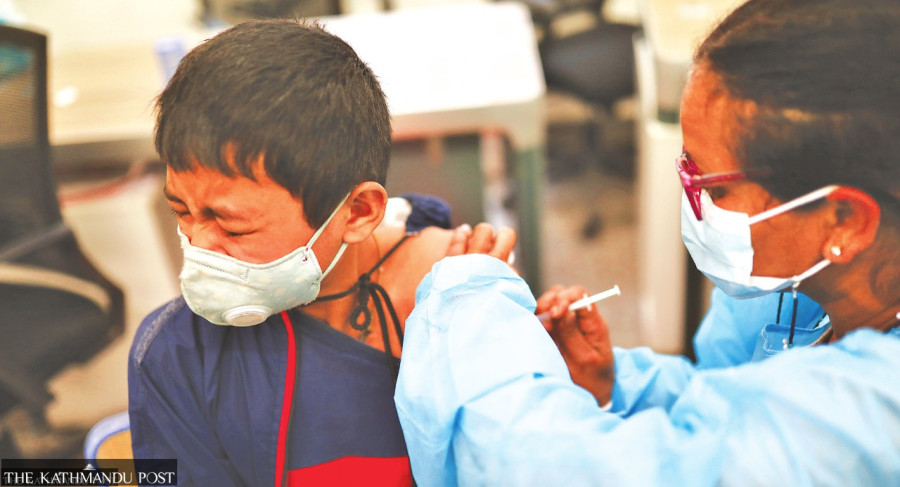Health
Health Ministry preparing to roll out Covid jabs for children aged 5–11 years
COVAX will supply 8.4 million Pfizer doses for the age group from next month.
Arjun Poudel
As paediatric doses of the Covid-19 vaccine for children between five and 11 years old are all set to arrive in the country, the Ministry of Health and Population has started preparations to roll out the jabs.
The Department of Health Services has already secured emergency use authorisation from the Department of Drug Administration for the Pfizer doses, provided master trainer training to health workers in all districts, and is working on the vaccine rollout plan, according to officials.
“Today [Tuesday] health workers from 56 districts received master trainer training on Pfizer vaccination for children. Health workers from 21 districts have already received such training,” Dr Bibek Kumar Lal, director at the Family Welfare Division of the department of Health Services, told the Post. “We have also started other preparations to roll out the vaccine once doses are supplied.”
Master trainer training is an advanced level training for health workers who will impart the training to other health workers in the respective districts on the ways to administer the jabs.
Officials said that Nepal will receive 8.4 million pediatric doses of the Pfizer-BioNTech vaccine free of cost. The United States government has to bear the cost of the vaccine doses, which will be supplied through the COVAX facility, the United Nations backed international vaccine-sharing scheme. The USAID had facilitated the process, officials say.
“Nepal is among the countries receiving pediatric doses of Covid-19 vaccine free of cost from COVAX,” said Lal. “COVAX has also asked about our storage capacity, and logistic supply conditions, among other things.”
Officials said that vaccine doses will be supplied in several consignments as the government does not have enough freezers to store all the doses at once.
The Health Ministry said that it can store only around 2 million doses of the Pfizer-BioNTech vaccine at one time in its central store in Kathmandu. The vaccine doses need to be stored at minus 80 degrees Celsius in ultra cold freezers, and can be kept in normal temperatures (2 to 8 degrees Celsius) for up to 31 days.
There are two types of Pfizer-BioNTech Covid vaccines for children—one is for those between five and 11 years, and another for those aged 12 and above. Nepal has already used Pfizer vaccines on those with comorbidities and on children between 12 and 17 years.
The Pfizer-BioNTech vaccine is the only jab recommended by the World Health Organisation for use in children between five and 11 years old.
The American Association of Paediatrics has recommended administering 10 microgram doses in a gap of 21 days to children between five and 11 years. The dose, 0.2ml, is one-third of what is administered to adolescents and adults.
The vaccine vial for 5–11 year olds comes with an orange cap while the other vial is purple-capped.
Each vial with 10 doses needs 1.3 millilitres (ml) of diluent under Pfizer’s preliminary plan.
The US Food and Drug Administration in October authorised emergency use of the Pfizer-BioNTech Covid vaccine for children between five and 11 years. Several countries have already started administering the vaccine to children.
Earlier, the government had decided to inoculate children between five and 11 years with the Covid-19 vaccine from April. For that the Health Ministry had also decided to purchase 8.4 million doses of the vaccine and also signed an agreement for a concessional loan of $18 million with the World Bank to procure the doses.
But with the Covid-19 infection rate dropping significantly of late, the process to procure vaccine doses for the said age group has been put on the back burner.
Officials said that plan to procure the vaccine doses halted after they saw a chance of getting vaccine doses free of cost.
Nepal so far has received 53,381,570 doses of Covid vaccines of various brands—AstraZeneca, Vero Cell, Moderna, Janssen, Sinovac-CoronaVac, and Pfizer-BioNTech.
As of Saturday, as many as 19,825,343 people or 67.9 percent of the total population have been fully vaccinated in the country, according to the Ministry of Health and Population.




 22.12°C Kathmandu
22.12°C Kathmandu















